Thursday, 5 July, 2018. 18:02
We have just returned from our second all-day game drive. We saw less wildlife and drove a lot further today, but the main highlights were truly worth it.
We both woke up early this morning, and we could hear the sound of some sort of animal in the distance, but didn’t know what it was, possibly hyenas? When the alarm went off we got up, dressed, and walked over to the dining tent in the soft dawn light before sunrise. The dawn was cold, very noticeably colder than yesterday, and stayed a bit cooler throughout the day.
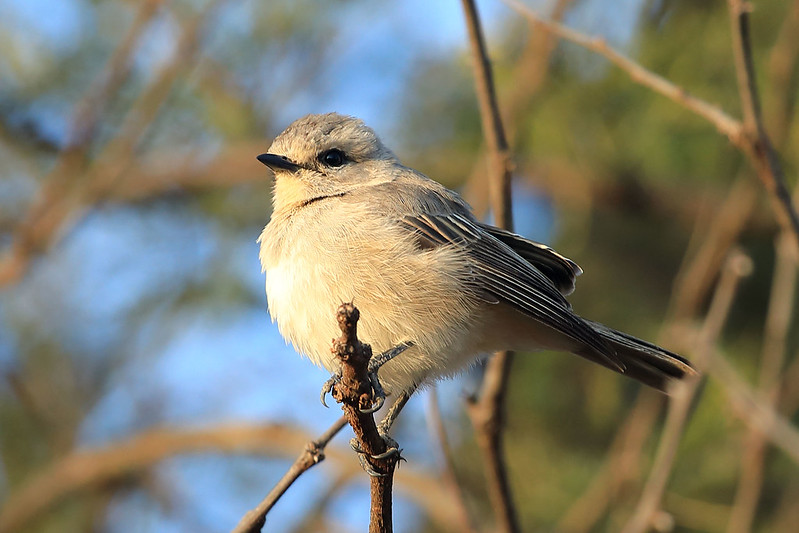 African grey flycatcher, dawn light at the camp |
Breakfast was the same choices as yesterday, but the “selection of pastries” was changed from banana bread. We said we’d have whatever the new choice was, plus muesli and yoghurt, and then today I chose the “Nimali Benedict” and M. had fried eggs with toast. The “pastries” turned out to be freshly made pikelets, which they gave us two each of. M. had honey on hers (stealing a jar from the next table) while I had butter. The benedict was a little rough, served on toasted slices of the odd bread they have here, smallish with a slightly sweet and grainy texture, almost like gluten-free bread. Perhaps it is; every time we order food they are careful to ask us if we have any allergies.
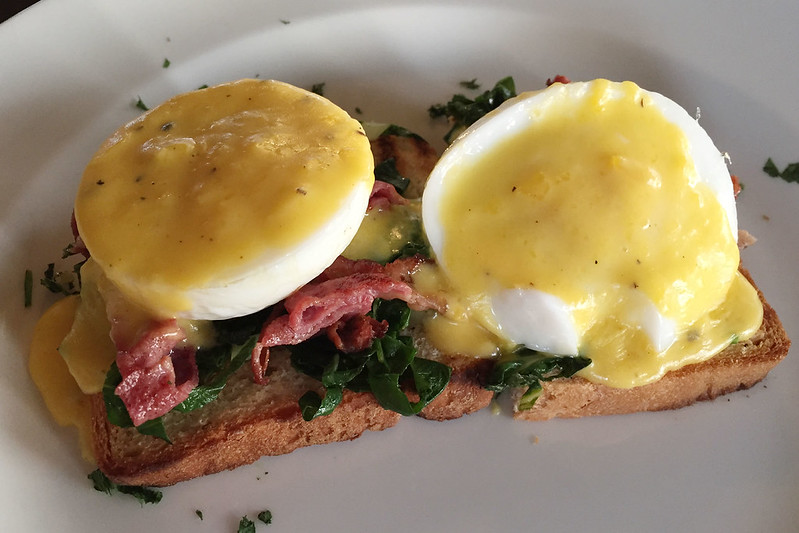 Nimali Benedict |
Despite getting up earlier than yesterday, we were later meeting Timba to begin our game drive. Breakfast took a bit longer, and we spent more time with a toilet stop before we were ready. Then we set off.
The first highlight unfolded over an hour or so. We stopped at a small group of cars, seeing that they had spotted a group of three female lions, sitting on a small rocky outcrop. They were looking around, surveying the area. Timba said they were looking for prey. We watched them for a while and took photos, but as we’d already seen several lions, Timba drove us off again while the other cars stayed there watching some more.
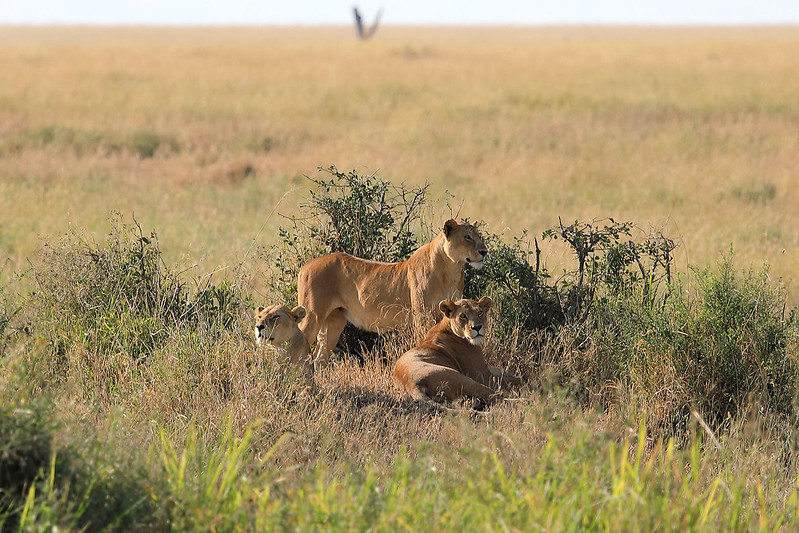 Group of three lions, surveying the area |
We did a bit of a circuit around a marshy area, spotting some birds and elephants and other things. We saw a lappet-faced vulture flying not far away and I took a few shots of it in flight, one of them turning out pretty well. As we were heading back to complete the loop, we passed through a troop of baboons moving along the road ahead of us. They scattered off into the grass as we passed, heading towards the area where we’d seen the lions. We thought perhaps they would get in trouble when they ran into the lions.
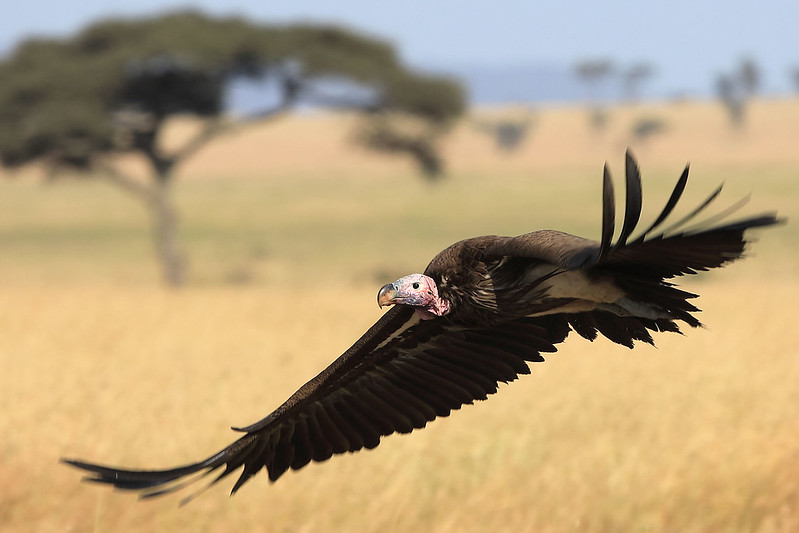 Lappet-faced vulture in flight |
And then we came across a large group of cars, parked on two roads surrounding a small area of land, maybe the size of a football field. We could see two Thomson’s gazelles there but nothing else. It was highly suspicious, because as Timba said, this many cars – there were close to twenty – couldn’t be just watching a couple of gazelles. We surmised that one or more of the lions were hunting them. We could see the rock outcrop, and there was one lion visible there, so perhaps two were out in the long grass stalking the gazelles. We watched for several minutes.I saw a bird in a nearby tree and moved my camera to take a photo of it… then suddenly Timba yelled, “There she goes!” I swung my camera down to shoot the action and got a shot of the gazelles running, but then Timba said, “She’s missed them!” The gazelles got away and the lion was left sitting there watching them run off. Lowering my camera I saw the animals, but I’d missed the crucial moment of action. Still, it had been exciting to be there when it happened.
We left the area and drove a bit more. Timba said he was planning to take us on a longer drive than yesterday, and where he was going there were not toilet facilities, so were we happy to go behind the car if we needed to, or did we want to head to the airstrip first for a toilet break now. M. wanted to use a proper toilet, so we drove to the airstrip and used the facilities there.
Then we were off, and it truly was a long drive. Timba took us away from the areas we’d traversed yesterday, which were full of trees and wetlands, and struck out across a vast bare grassland, with no trees in sight except far on the horizon. In this sort of landscape I’d previously expected to see vast herds of herbivores, but it was pretty empty except for occasional groups of gazelles, and an odd ostrich. The grass waved in the wind, setting up pastel waves of colour stretching to the distant horizon under a huge open sky dotted with pale clouds. It was really very beautiful. But it unrolled for tens of kilometres with nothing much else to see.
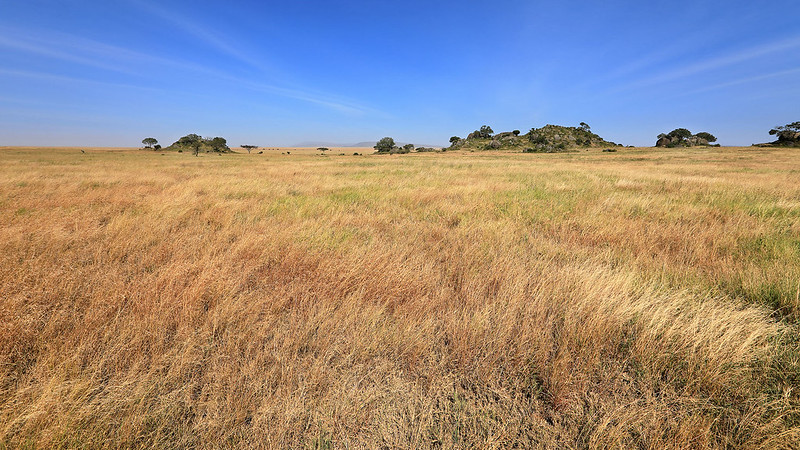 The grassland plains of the Serengeti |
During this drive, Timba was on the radio, chatting urgently with someone in Swahili. Eventually we reached an outcrop of rocks, and circled this. I scanned the rocks intently for animals, half expecting to see a lion sitting atop a rock. Timba stopped when another vehicle approached and had a long conversation in Swahili, then he turned around and started circumnavigating the rocks again. Eventually he stopped the car and explained to us that the news was that there were two cheetahs in the vicinity of a tree which he pointed out on the horizon about a kilometre away. However there was no road nearby, so to get close enough to see them meant going off road, which technically is prohibited in Serengeti National Park. And there was a park ranger patrolling nearby, so we (and the other three cars we could see roaming the area around us) were killing time until the ranger left.
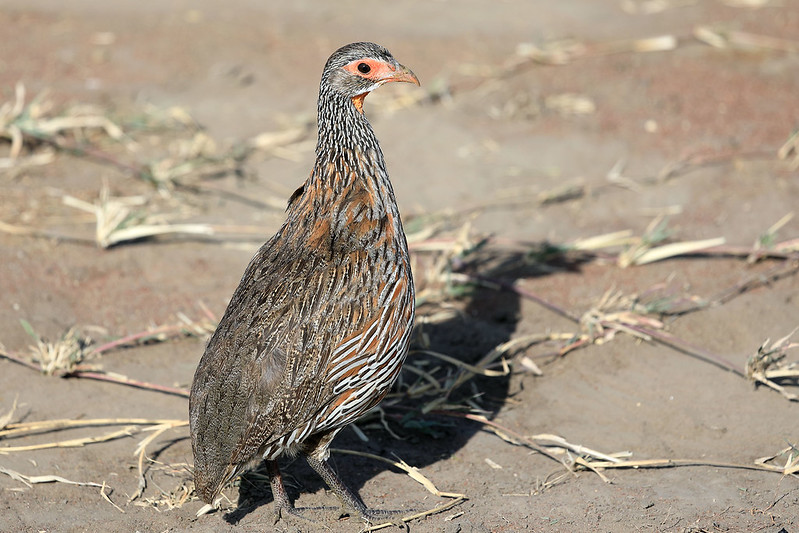 Yellow-necked spurfowl |
We did a few slow circuits of the rocks, looking half-heartedly for anything interesting. Then there was a burst of Swahili from the radio and suddenly Timba gunned the engine and raced up the road until we were as close to the tree as we could get. The other cars arrived in quick succession and we all took off cross country, off-road, to the tree. When we got there we circled it and the nearby trees a couple of times, but there was nothing to be seen. We returned to the road, as did the other cars. One stopped near us and the driver looked like he wanted to speak to Timba, but Timba merely give him a shrugged “I don’t know” and kept driving.
He continued along the road in the direction we’d been heading to get here, crossing more open grassland. We drove rapidly, and I assumed he was taking us to more promising areas beyond this sea of featureless grass, having give. up on the cheetahs. We must have covered ten kilometres or more, and a few trees began to dot the plain again. Then suddenly Timba said, “There’s the cheetah!” and pointed out to the left of the road ahead, where a couple of cars were sitting. He turned off the road and raced over, and we saw it, a cheetah sitting there, just a few metres from the cars. Timba drove up and put us within about twenty metres of the great cat as well, close enough for some amazing views and photos. It was a gorgeous animal, with a golden coat densely spotted with black dots, lean and muscular, looking around in search of prey to chase down. She (Timba identified it as a female) seemed completely unconcerned about the cars nearby and wandered slowly across the grass as we followed and jostled for the best viewing spots.
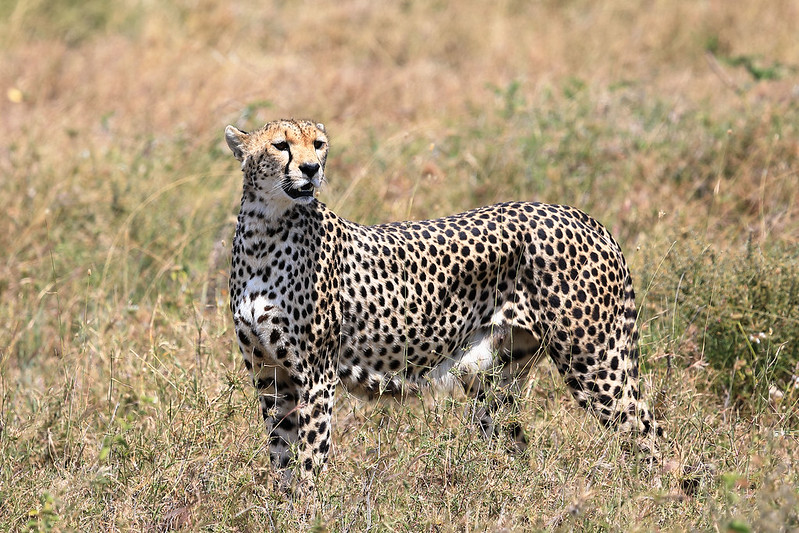 The cheetah |
Timba explained that the hot news on the radio this morning had been about the cheetahs, and he’d driven us this great distance for a chance to see one. They are endangered animals and quite rare and difficult to find. M. asked how often he sees them, and he said about 4 times out of 10 attempts, less than half the time. He apologised for taking us such a long way, but we assured him it was totally worth it and we were very happy to see a cheetah.
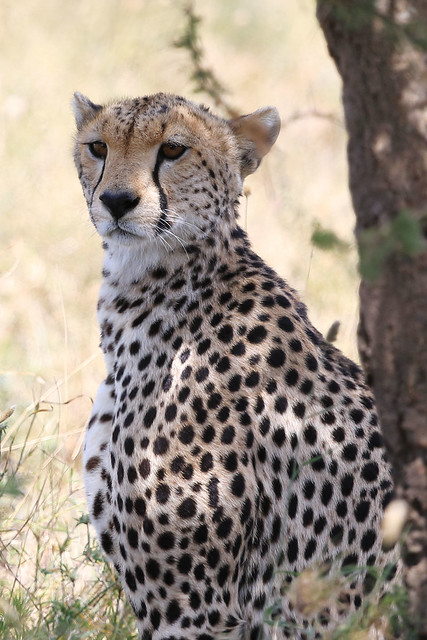 Cheetah close up |
Leaving the big cat, we continued driving further in roughly the same direction. Soon we came across a group of four male lions sleeping under a tree. Again Timba drove off the road, maybe 100 metres or so, to get a close up look. The lions must have eaten recently, he said, as they didn’t even bother to look up at us as we drove right up to them. The closest was just a couple of metres away from the car on the drivers’ side. And then suddenly we saw Timba opening his door! M and I both stood shocked in alarm, wondering what he was doing. But before we could react, he slammed his door closed, creating a noise, designed to wake up the lions. The one nearest us raised its head and looked around, allowing me to get some good photos, but otherwise didn’t stir. After a while another lion rolled over on its back, with its belly up and paws up in the air. I got a good close up shot of a single paw, we were that close.
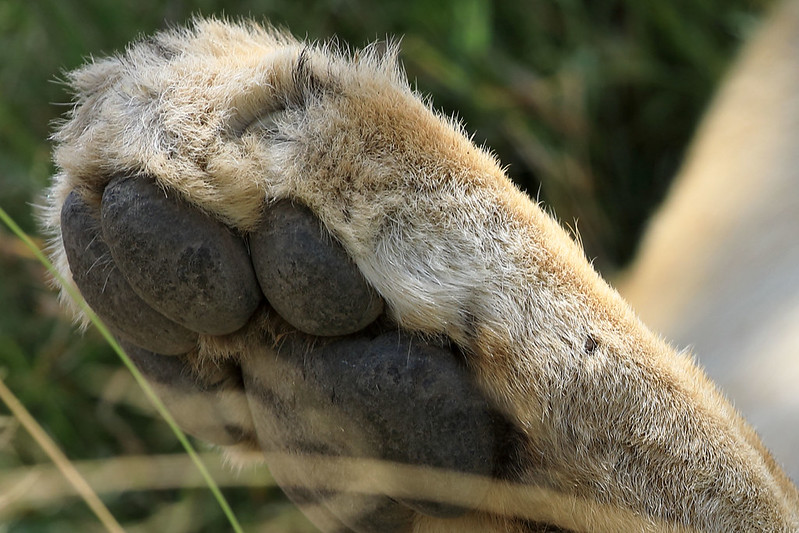 The lion’s paw |
Leaving the lazy lions, we continued further onward, taking a turn onto a much less used road, which ran along a gully. The terrain here was very different from the trees and wetlands where we’d been yesterday, looking more like desert, with rocky ground and scrubby grass and stunted bushes, punctuated by dry rocky valleys where water must run in the rainy season. He took us around a dry wash, where mostly we spotted ostriches and the odd gazelle and some birds. But at one point we stopped to look at a bird and Timba pointed out that we were right next to a leopard tortoise, a large tortoise with a high rounded shell. Timba said the leopard tortoise was one of the “small five” animals, in contrast to the Big Five.
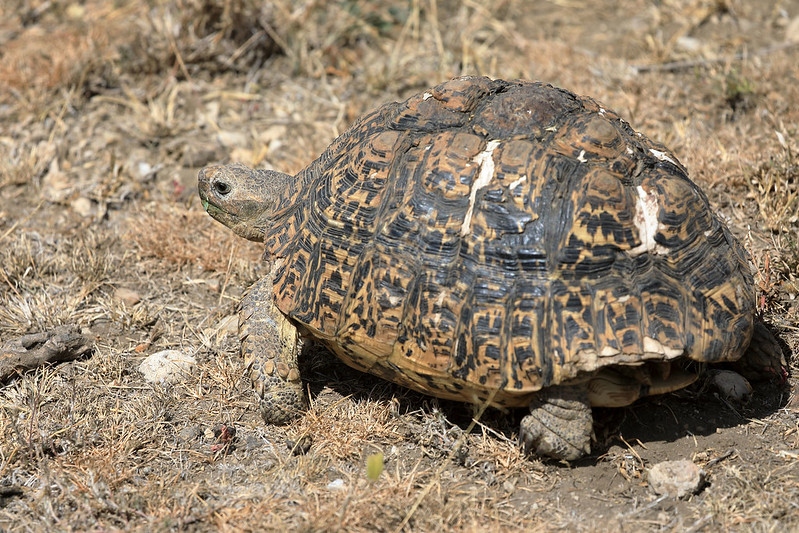 Leopard tortoise |
By now it was well after midday and we were getting hungry, so requested a lunch stop soon. Timba said we would stop as soon as he could find a tree for shade, because at the moment there were none in sight. He continued along a dry wash until finally we spotted a tree near some rocks on the other side of the wash. He took us off road to get to the tree, where we parked in the shade to enjoy our packed lunches.
This time there were vegetable empanadas, of which M. had two, while I had one plus a scotch egg. There was also a small cheese sandwich, a piece of chocolate cake, and a tiny banana, which was very sweet, as M. reminded us that Danny at Acacia Farm had told us that the small bananas are the sweetest. As we ate lunch, here in the middle of nowhere, with basically nothing in sight but grassland in all directions and one tree, under which we’d parked. And Timba went out and had a conversation with someone on his mobile phone. So even here he got reception.
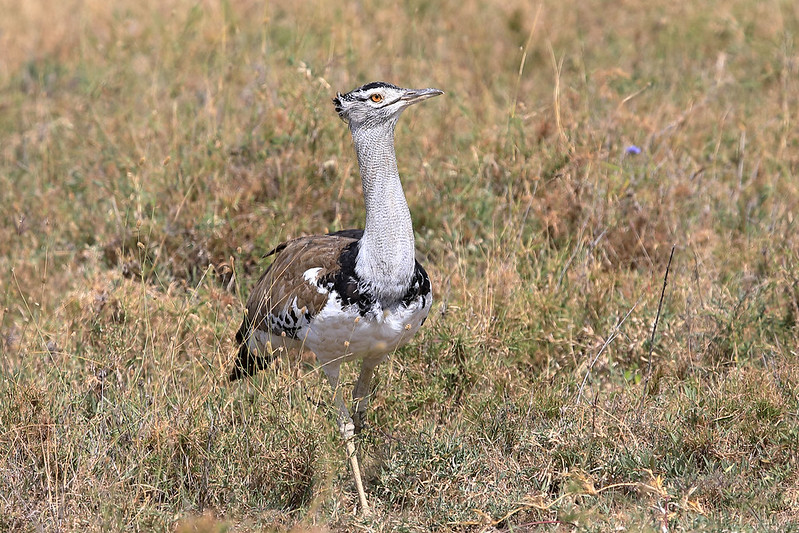 Kori bustard |
We continued driving across the plain in the same direction for a while, aiming at some rock outcrops that appeared on the horizon. Eventually we arrived, and circled them, looking for something. What we found was a hyena, sitting sheltered under a rock, staring out at us. This marked the furthest point of our travel for the day, I don’t know how many kilometres from our camp, but it could easily have been a hundred or more. Timba began returning in the direction we’d come, but veered off on a different road taking us more to the left, and then suddenly he turned off the road and roared across the open grass, towards a series of rock outcrops way on the horizon. I thought he was aiming to reach them to look for more animals, but just before we got there we hit another road, parallel to the one we’d come from, and he turned onto that and drove along it.
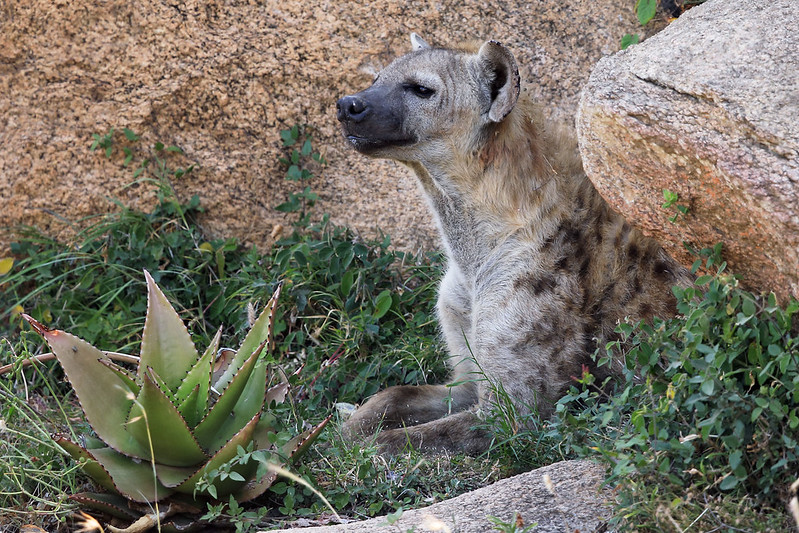 Sheltering hyena |
Thus we headed back towards the area nearer our camp. It took a lot of driving across the flat grassland to get back to areas featuring trees, rivers, and hills. Along the way we spotted a few animals, including hartebeest and waterbuck, two large and bulky antelope. We hadn’t seen waterbuck before, so it was good to some of these very heavy looking and hairy creatures. They have more of the heftiness of deer about them than slimline antelope. But finally we made it.
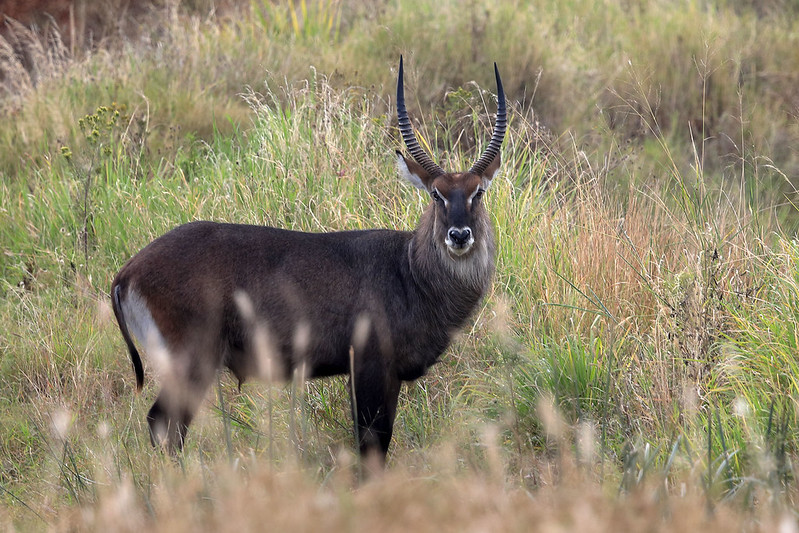 Waterbuck |
Then he took us to the Serengeti Visitor Centre, near the very middle of the park. This was for a toilet stop and also to give Timba a chance to refuel the Land Cruiser. While he did that, he suggested we take a short tour of the centre, and a guide would take us on a short walk around some displays. A young man came out and introduced himself, then after we returned from the toilets he showed us around. First he took us to an office where another man showed us in great detail all the features of a park map, which came with a booklet field guide of animals and plants of the park. It cost US$25, and he seemed to want to know if we wanted to buy one right now. We said we’d do our tour first and think about it, then maybe come back. We actually decided it would be a good souvenir and the field guide would be very useful for identifying species in all my photos, so when we came back we bought one, using local currency of 50,000 shillings instead of the slightly higher price in US$.
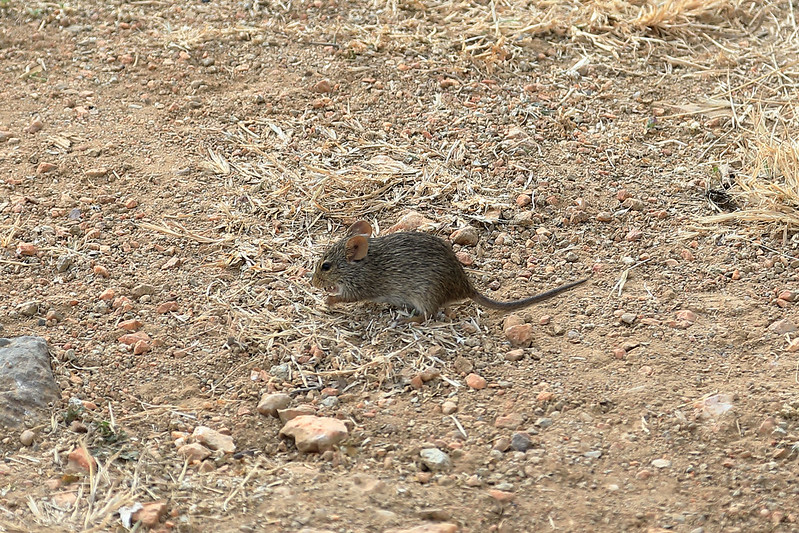 Wild mouse in the Serengeti Visitor Centre |
The tour was a quick walk around a set of informative displays set into a series of up and down steps built around a rock outcrop. Our guide talked us through maybe 20% of the displays, as he knew we only had 20 minutes or so while Timba refuelled the car. He told us about the migrations of animals around Serengeti, and some of the history of the park, then dropped us back at the office where we bought the map. Done, we returned to find Timba and the car ready to go.
Then it was the drive back to our camp, which took some time as we were still a fair distance away. We stopped only briefly for a few minor animal encounters. And where last night we had hyenas lying on the road near our camp, tonight we had an ostrich sitting on the road.
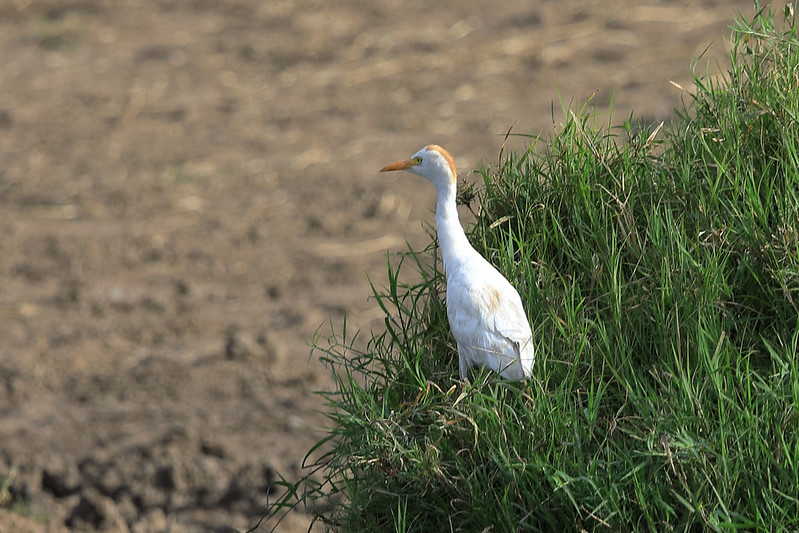 Cattle egret |
Timba said he’d pick us up at 07:30 tomorrow for the drive to Ngorongoro, and left us to have dinner. We dropped stuff in our room, then went to sit out near the bonfire again before dinner. I’d tried the Safari and Kilimanjaro beers, and wanted to try the third on offer, which the guy said was called Tusker. But he emerged with another bottle labelled Serengeti, and said the Tusker wasn’t cold enough to serve. The Serengeti beer was more like a lager I’m used to, more hoppy and bitter than the sweetish Safari and Kilimanjaro. The staff also brought us a huge bowl of beer nuts.
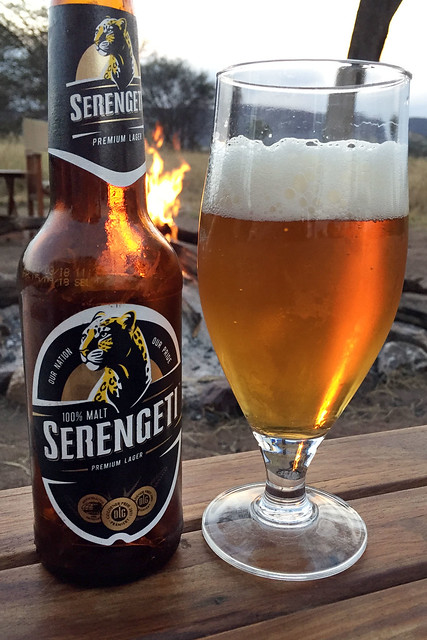 Serengeti beer |
For dinner, the courses tonight were butternut pumpkin soup, followed by tilapia with a white sauce, vegetables (carrots, eggplant, and zucchini in a spicy sauce), and coconut rice (the fish was replaced by a capsicum stuffed with spiced lentils and corn for M.), and then a chocolate mousse for dessert. Again it was all good. The mousse was dense and slightly grainy, not a creamy sort, but nice. While we ate, a zebra wandered by, maybe five metres from the front of the tent, perhaps even less, it was that close.
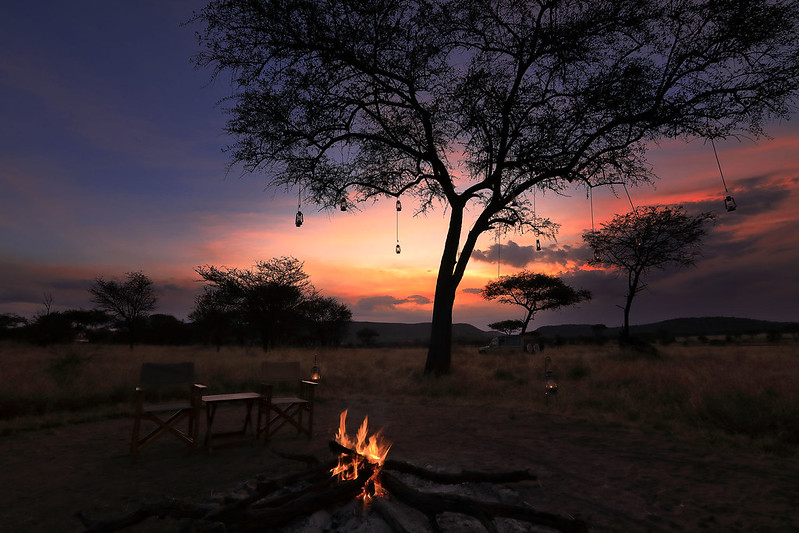 Sunset at Nimali camp |
After dinner, it was time again to retire to our room, shower, and go to sleep. On the walk back, escorted by a staff member wielding nothing but a torch, we heard animal noises in the distance. We asked what animal it was and he casually said, “Hyenas”. This was the same noise we’d heard during the night! We wondered what he would do with his torch if a bunch of hyenas leapt out at us while walking back to the tent.
